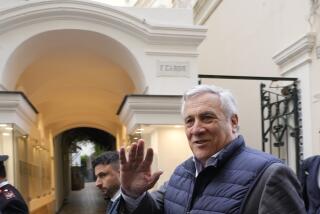U.S., EC to Study Sanctions Aimed at Iran Arms Buildup : Diplomacy: Europeans get briefing from Christopher. Talk of Tehran’s programs gives foreign ministers a break from Bosnia.
- Share via
LUXEMBOURG — European nations, which have consistently rebuffed American efforts to isolate Iran, agreed Wednesday to consider economic sanctions against the Tehran regime to force it to abandon clandestine nuclear, chemical and missile weapons programs.
European Community foreign ministers approved a joint U.S.-EC study of Iran’s arms buildup after Secretary of State Warren Christopher outlined American intelligence information that he said documented the Islamic republic’s efforts to obtain weapons of mass destruction.
“Iran must understand that it cannot have normal commercial relations . . . on the one hand while trying to develop weapons of mass destruction on the other,” Christopher told a news conference after his meeting with the 12 EC foreign ministers. He specifically called for a ban on the sale of dual-use technology that has both civilian and military applications.
Talk of Iran was a welcome respite for both Christopher and the Europeans from the West’s inability to stop the carnage in Bosnia-Herzegovina. Christopher’s staff made a concerted effort to use Iran to divert attention from Bosnia.
Although the ethnic war over the ruins of the Yugoslav federation topped the agenda for these talks, neither the United States nor the European Community went beyond their already well-known positions on the matter. A U.S. official said he heard nothing new from either side.
Concerning Iran, Christopher said that the European nations, which have long enjoyed a flourishing commerce with Tehran, are well placed to bring economic pressure on the regime. Washington’s own trade ties with Iran are limited, although the Boeing Co. has asked permission to sell 16 commercial jet aircraft to Iran for about $900 million. The White House is expected to decide soon if it will let the sale go through. Christopher recommended that it be turned down.
“Iran’s economy is in trouble,” Christopher said. “Iran will be vulnerable to concerted pressure from the West if it is clear that we seek strictly defined changes in its behavior.”
Danish Foreign Minister Niels Helveg Petersen, president of the EC foreign ministers under the Community’s system of rotating leadership, said that proliferation of nuclear and other mass-destruction weapons is “one of the greatest challenges of the ‘90s.” He agreed with Christopher that it is time to consider joint U.S.-EC action against Iran.
U.S. officials said they expect the study to be completed in time for it to be considered by EC foreign ministers at their next regularly scheduled meeting in September.
Although the Europeans did no more than agree to study the issue, they gave Christopher a far more sympathetic hearing than they afforded the George Bush Administration last year when it sought their help in bringing pressure on Iran. The Europeans balked at a proposed embargo on the sale of dual-use technology and refused to block International Monetary Fund loans to Tehran. A senior State Department official said the Europeans “gave us far more than we had expected” Wednesday.
Iran’s own economic troubles may have more to do with the change in attitude than Christopher’s persuasiveness. Germany and France, Iran’s two biggest European trading partners, have already adopted some restrictions because of concern that Tehran will be unable to pay its bills.
After the EC meeting in Luxembourg, Christopher flew to Athens for meetings today with North Atlantic Treaty Organization foreign ministers and Friday with the North Atlantic Cooperation Council, a hybrid organization linking NATO with members of the defunct Warsaw Pact. The Bosnia conflict is expected to resume its place at center stage in those meetings.
A British source said that NATO members will try to persuade Russia to contribute ground troops to the U.N. force protecting six Muslim safe areas in Bosnia designated by the U.N. Security Council.
If Moscow agrees to send part of its still formidable army to Bosnia, it would add substantially to the United Nations’ firepower. Also, the presence of Russian troops helping to protect Muslim civilians from attack by Bosnian Serb militiamen would send a strong signal to Serbia, Russia’s traditional ally.
But if Russian forces join the U.N. troops on the ground, it would also underline the absence of American soldiers. The Clinton Administration has ruled out commitment of U.S. ground forces until the warring Bosnian parties agree on a peace plan, an increasingly unlikely prospect.
The Administration has offered to provide U.S. air cover for the U.N. troops, but a senior official said Tuesday that Christopher hopes to persuade NATO to provide the air power as an alliance-wide responsibility.
U.S. officials were stung Tuesday when Lord Owen, the EC’s Bosnia mediator, complained that “the United States, as the most powerful country in NATO, is not ready to contribute ground forces.”
Christopher complained to the EC foreign ministers about Owen’s remarks.
More to Read
Sign up for Essential California
The most important California stories and recommendations in your inbox every morning.
You may occasionally receive promotional content from the Los Angeles Times.













